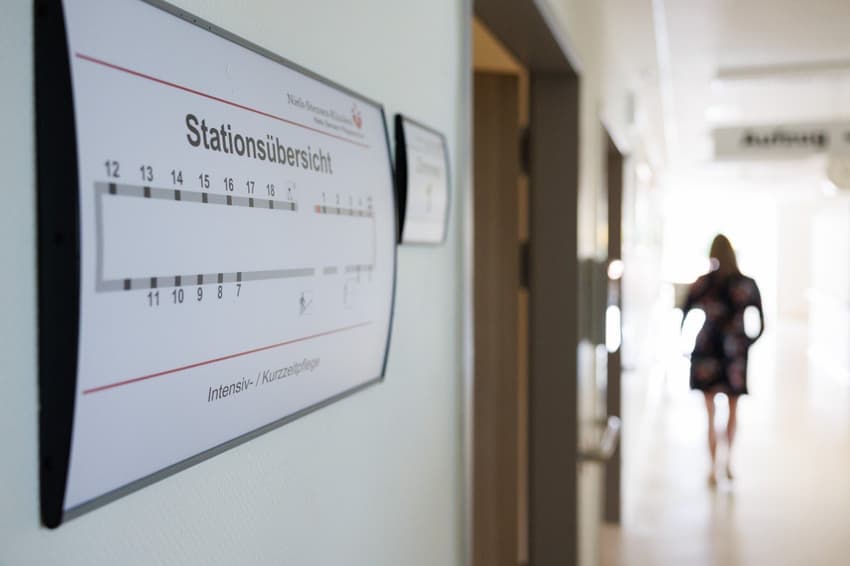EXPLAINED: What Germany's new hospital reform plans mean for patients

Germany's health ministers have agreed on a plan to radically reshape the way hospitals in Germany work, including a new financing system and more transparency for patients.
What's going on?
The debate over the future of Germany's hospitals had been raging on for a while, but on Monday afternoon, Health Minister Karl Lauterbach (SPD) appeared at a press conference with the health ministers in the federal states to announce that there had been a breakthrough.
Following a meeting in Berlin, the ministers agreed on an outline of reforms to the healthcare system that will drastically reshape the way hospitals are financed with the aim of improving overall care. Fourteen of the sixteen states voted in favour of the changes, with Bavaria voting against and Schleswig-Holstein abstaining.
Welcoming the news on Monday, SPD healthcare expert Dagmar Schmidt described the agreement as a "good result", adding that the plans would help preserve comprehensive care while boosting the quality of the services patients receive.
It's been seen as a major win for Lauterbach, who has had the reforms in his sights since taking over the health minister brief in 2021.
READ ALSO: German health insurance contributions 'to rise in 2024'
What have the heath ministers agreed?
Primarily, the new plans are about shifting the criteria for hospital financing in order to reduce backlogs and ensure there are consistent standards for specific types of care.
At the moment, hospitals are generally funded based on the number of cases they treat - a system Lauterbach says has led to a "hamster wheel" effect of clinics taking on as many patients as possible and treating illnesses they may not have much expertise in. One key example of this is smaller rural hospitals that may decide to intervene in a rare and complex type of cancer, even if they can't deliver a good service due to a lack of experienced staff or the right facilities.
To prevent this from happening, the health ministers plan to shift the focus from quantity to quality. That means that hospitals will in future receive money based on the services they provide - as long as these services are delivered to a good standard.

Medical staff descend the stairs at Ankum Hospital in Lower Saxony. Photo: picture alliance/dpa | Friso Gentsch
So, if a hospital wants to offer services for people with kidney problems, specialised cancer treatment or an infectious disease service, for example, they will have to prove they have the right facilities, staff and experience to do so. If they can do that, they'll receive a flat rate for the service area as well as being able to charge for the treatments given.
READ ALSO: Do doctors in Germany have too little time for their patients?
How will patients be affected?
While all of this may sound like a purely technical tweak to the system, it could well have a knock-on effect on patients - and especially those in more rural areas. With hospitals expected to offer a premium service for every type of treatment they provide, it's likely that smaller hospitals could reduce their range of services in favour of delivering basic care to a higher standard.
That would potentially mean more travelling for people with complex health issues who live in remote areas, though on the flipside it could also mean that basic care in the countryside will at least be more reliable.
Another major change that the ministers are working on is a so-called Transparency Act, which would give patients a wealth of information about the hospitals in their region and the type of care they offer. That means that in future, patients could be able to look up key information on the availability and quality of certain types of care - and potentially the expected waiting times or number of patients being treated - in order to pick a clinic that could best cater to them.
One idea that had also been floated was a new classification system for hospitals that would rank them according to three care levels: basic care, standard and specialised care, and maximum care (i.e. in university hospitals). However, there's so far been no firm agreement on this.
READ ALSO: Could it soon get harder to get private health insurance in Germany?
Why is this needed?
Over the past 30 years, the number of hospitals in Germany has been in freefall. In 1991, the country could boast 2,400 clinics, dropping to 2,000 in 2010 and 1,700 today.
Speaking to Zeit recently, Lauterbach issued a stark warning: "We really are on the cusp of hospitals dying out," he said. "I can no longer stop that."
But with his package of reforms, the SPD politician hopes to at least stem the tide - particularly when it comes to smaller clinics outside of the big metropoles. The new financing system will work as a kind of "survival guarantee" for these rural hospitals, he said.

Health Minister Karl Lauterbach (SPD) explains his hospital reform plans at a press conference in Berlin. Photo: picture alliance/dpa | Jörg Carstensen
Nevertheless, it's unclear if there will be additional federal financing made available to bolster the fortunes of hospitals around the country, with Lauterbach refusing to "raise hopes" of a major cash injection.
In addition, ministers have relatively limited control over whether hospitals stay open or close: that's a decision for the owners, although politicians can create more attractive conditions for them to work in.
READ ALSO: EXPLAINED: What happens if you’re off sick for a long time in Germany
At the press conference, Lauterbach explained that more closures were likely - at least until the reforms start to have an impact. That's because the ministers were unable to come to an agreement sooner, he explained.
What are the next steps?
With the outline of the reforms now agreed on by the health ministers, Lauterbach has promised to work with the federal states to draft a bill over the summer holidays that would clarify some remaining issues - most notably financing.
This would then be voted on by the Bundestag and Bundesrat in the autumn.
If all goes to plan, the new financing system and transparency rules would come into force on January 1st, 2024. The implementation phase would then happen in stages in each of the federal states.
Comments
See Also
What's going on?
The debate over the future of Germany's hospitals had been raging on for a while, but on Monday afternoon, Health Minister Karl Lauterbach (SPD) appeared at a press conference with the health ministers in the federal states to announce that there had been a breakthrough.
Following a meeting in Berlin, the ministers agreed on an outline of reforms to the healthcare system that will drastically reshape the way hospitals are financed with the aim of improving overall care. Fourteen of the sixteen states voted in favour of the changes, with Bavaria voting against and Schleswig-Holstein abstaining.
Welcoming the news on Monday, SPD healthcare expert Dagmar Schmidt described the agreement as a "good result", adding that the plans would help preserve comprehensive care while boosting the quality of the services patients receive.
It's been seen as a major win for Lauterbach, who has had the reforms in his sights since taking over the health minister brief in 2021.
READ ALSO: German health insurance contributions 'to rise in 2024'
What have the heath ministers agreed?
Primarily, the new plans are about shifting the criteria for hospital financing in order to reduce backlogs and ensure there are consistent standards for specific types of care.
At the moment, hospitals are generally funded based on the number of cases they treat - a system Lauterbach says has led to a "hamster wheel" effect of clinics taking on as many patients as possible and treating illnesses they may not have much expertise in. One key example of this is smaller rural hospitals that may decide to intervene in a rare and complex type of cancer, even if they can't deliver a good service due to a lack of experienced staff or the right facilities.
To prevent this from happening, the health ministers plan to shift the focus from quantity to quality. That means that hospitals will in future receive money based on the services they provide - as long as these services are delivered to a good standard.

So, if a hospital wants to offer services for people with kidney problems, specialised cancer treatment or an infectious disease service, for example, they will have to prove they have the right facilities, staff and experience to do so. If they can do that, they'll receive a flat rate for the service area as well as being able to charge for the treatments given.
READ ALSO: Do doctors in Germany have too little time for their patients?
How will patients be affected?
While all of this may sound like a purely technical tweak to the system, it could well have a knock-on effect on patients - and especially those in more rural areas. With hospitals expected to offer a premium service for every type of treatment they provide, it's likely that smaller hospitals could reduce their range of services in favour of delivering basic care to a higher standard.
That would potentially mean more travelling for people with complex health issues who live in remote areas, though on the flipside it could also mean that basic care in the countryside will at least be more reliable.
Another major change that the ministers are working on is a so-called Transparency Act, which would give patients a wealth of information about the hospitals in their region and the type of care they offer. That means that in future, patients could be able to look up key information on the availability and quality of certain types of care - and potentially the expected waiting times or number of patients being treated - in order to pick a clinic that could best cater to them.
One idea that had also been floated was a new classification system for hospitals that would rank them according to three care levels: basic care, standard and specialised care, and maximum care (i.e. in university hospitals). However, there's so far been no firm agreement on this.
READ ALSO: Could it soon get harder to get private health insurance in Germany?
Why is this needed?
Over the past 30 years, the number of hospitals in Germany has been in freefall. In 1991, the country could boast 2,400 clinics, dropping to 2,000 in 2010 and 1,700 today.
Speaking to Zeit recently, Lauterbach issued a stark warning: "We really are on the cusp of hospitals dying out," he said. "I can no longer stop that."
But with his package of reforms, the SPD politician hopes to at least stem the tide - particularly when it comes to smaller clinics outside of the big metropoles. The new financing system will work as a kind of "survival guarantee" for these rural hospitals, he said.

Nevertheless, it's unclear if there will be additional federal financing made available to bolster the fortunes of hospitals around the country, with Lauterbach refusing to "raise hopes" of a major cash injection.
In addition, ministers have relatively limited control over whether hospitals stay open or close: that's a decision for the owners, although politicians can create more attractive conditions for them to work in.
READ ALSO: EXPLAINED: What happens if you’re off sick for a long time in Germany
At the press conference, Lauterbach explained that more closures were likely - at least until the reforms start to have an impact. That's because the ministers were unable to come to an agreement sooner, he explained.
What are the next steps?
With the outline of the reforms now agreed on by the health ministers, Lauterbach has promised to work with the federal states to draft a bill over the summer holidays that would clarify some remaining issues - most notably financing.
This would then be voted on by the Bundestag and Bundesrat in the autumn.
If all goes to plan, the new financing system and transparency rules would come into force on January 1st, 2024. The implementation phase would then happen in stages in each of the federal states.
Join the conversation in our comments section below. Share your own views and experience and if you have a question or suggestion for our journalists then email us at [email protected].
Please keep comments civil, constructive and on topic – and make sure to read our terms of use before getting involved.
Please log in here to leave a comment.